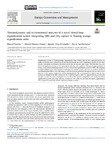Thermodynamic and Environmental Analyses of a Novel Closed Loop Regasification System Integrating ORC and CO2 Capture in Floating Storage Regasification Units

Use este enlace para citar
http://hdl.handle.net/2183/30711
A non ser que se indique outra cousa, a licenza do ítem descríbese como Atribución-NoComercial-SinDerivadas 4.0 Internacional
Coleccións
- GI- INGEN-Artigos [18]
Metadatos
Mostrar o rexistro completo do ítemTítulo
Thermodynamic and Environmental Analyses of a Novel Closed Loop Regasification System Integrating ORC and CO2 Capture in Floating Storage Regasification UnitsData
2022Cita bibliográfica
NAVEIRO, Manuel, et al. Thermodynamic and environmental analyses of a novel closed loop regasification system integrating ORC and CO2 capture in floating storage regasification units. Energy Conversion and Management, 2022, vol. 257, p. 115410. ISSN 0196-8904. https://doi.org/10.1016/j.enconman.2022.115410.
(https://www.sciencedirect.com/science/article/pii/S0196890422002060)
Resumo
[Abstract] Regasification systems in Floating Storage Regasification Units (FSRUs) that use the steam generated by the boilers as the heat source (closed loop) in the liquefied natural gas (LNG) regasification process are less detrimental to the marine environment than those systems that use seawater (open loop). Their drawback, however, lies in the significant increase in fuel consumption and, thus, CO2 emissions. The present paper performs an
energy, exergy and environmental analysis of a novel closed-loop regasification system for FSRUs that integrates an organic Rankine cycle (ORC) and post-combustion CO2 capture system with a 30 wt% aqueous solution of monoethanolamine (MEA). LNG cold energy is utilised for power generation through the ORC as well as in the processes of CO2 capture, compression, drying and liquefaction. The system proposed is able to meet the electrical
power demand of the FSRU without the use of dual fuel engines, while CO2 capture efficiency in the boiler flue gases exceeds 90%. Fuel consumption is cut by 18% in this system in comparison with existing closed-loop regasification systems, and exergy efficiency increases by 14%, while CO2 emissions decrease by approximately 75% compared to open-loop systems commonly installed on board.
Palabras chave
Floating storage regasification unit
Exergy analysis
Liquefied natural gas cold energy
Post-combustion CO2 capture
Organic Rankine cycle
Exergy analysis
Liquefied natural gas cold energy
Post-combustion CO2 capture
Organic Rankine cycle
Versión do editor
Dereitos
Atribución-NoComercial-SinDerivadas 4.0 Internacional
ISSN
0196-8904






